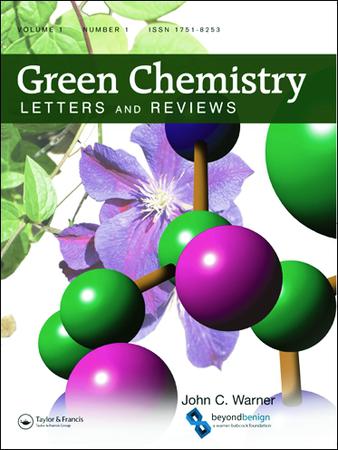Green synthesis of gold and silver nanoparticles as antidiabetic and anticancerous agents
IF 5.8
3区 化学
Q1 CHEMISTRY, MULTIDISCIPLINARY
引用次数: 0
Abstract
Green nanotechnology is an eco-friendly method for the biosynthesis of metallic nanoparticles, which are being used due to their unique features and bio-applications in various fields. World Health Organization (WHO) stated that the use of medicinal plants to treat a variety of disorders, such as diabetes mellitus (DM), cancer, HIV infection, hepatitis, tuberculosis (TB), and malaria is very effective. Green synthesis is a cost-effective, environment- friendly, and safe method. There are a wide variety of native medicinal plants around the world, owing to their unique physical, chemical, and biological characteristics, used for gold and silver nanoparticle (NP) synthesis, and are potent among all metal nanoparticles. However, as an alternative to several traditional techniques to synthesize nanoparticles, green chemistry has arisen. This review covers the green synthesis of AuNPs/AgNPs and its significance as a potent anticancer and antidiabetic agent. All literature surveys will be helpful in terms of further progress as to go from summarizing or concluding data along challenges and future perceptions.绿色合成金、银纳米颗粒作为抗糖尿病和抗癌剂
绿色纳米技术是一种生态友好的金属纳米粒子生物合成方法,由于其独特的特性和生物应用在各个领域得到广泛应用。世界卫生组织(世卫组织)指出,利用药用植物治疗各种疾病,如糖尿病、癌症、艾滋病毒感染、肝炎、结核病和疟疾是非常有效的。绿色合成是一种经济、环保、安全的合成方法。世界各地有各种各样的原生药用植物,由于其独特的物理、化学和生物学特性,用于金和银纳米颗粒(NP)的合成,是所有金属纳米颗粒中最有效的。然而,作为几种传统合成纳米颗粒技术的替代方法,绿色化学已经兴起。本文综述了AuNPs/AgNPs的绿色合成及其作为一种有效的抗癌和降糖药物的意义。所有的文献调查将有助于进一步的进展,从总结或总结数据沿着挑战和未来的看法。
本文章由计算机程序翻译,如有差异,请以英文原文为准。
求助全文
约1分钟内获得全文
求助全文
来源期刊

Green Chemistry Letters and Reviews
CHEMISTRY, MULTIDISCIPLINARY-GREEN & SUSTAINABLE SCIENCE & TECHNOLOGY
CiteScore
9.10
自引率
3.00%
发文量
48
期刊介绍:
Green Chemistry Letters and Reviews is an Open Access, peer-reviewed journal focused on rapid publication of innovative new syntheses and procedures that reduce or eliminate the use and generation of hazardous materials. Reviews of state-of-the-art green chemistry technologies are also included within the journal''s scope.
Green Chemistry Letters and Reviews is divided into three overlapping topic areas: research, education, and industrial implementation. The journal publishes both letters, which concisely communicate the most time-sensitive results, and reviews, which aid researchers in understanding the state of science on important green chemistry topics. Submissions are encouraged which apply the 12 principles of green chemistry to:
-Green Chemistry Education-
Synthetic Reaction Pathways-
Research and Process Analytical Techniques-
Separation and Purification Technologies-
Renewable Feedstocks-
Degradable Products
 求助内容:
求助内容: 应助结果提醒方式:
应助结果提醒方式:


